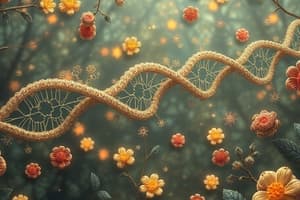Podcast
Questions and Answers
What are the four major biological molecules?
What are the four major biological molecules?
- Carbohydrates, lipids, proteins, nucleic acids (correct)
- Enzymes, hormones, DNA, RNA
- Glucose, cellulose, starch, cholesterol
- Sugars, fats, vitamins, minerals
What is the Central Dogma of Molecular Biology?
What is the Central Dogma of Molecular Biology?
- RNA is transcribed to DNA, which is translated to protein
- DNA is transcribed to RNA, which is translated to protein (correct)
- Protein is transcribed to DNA, which is translated to RNA
- DNA is translated to protein, which is transcribed to RNA
What is the likely origin(s) of water on Earth?
What is the likely origin(s) of water on Earth?
- Volcanic eruptions and meteorite impacts
- Chemical reactions between rocks and atmosphere
- Underground aquifers and oceanic vents
- Cometary bombardment and outgassing from the Earth's interior (correct)
What are the properties of water that make it so important to life?
What are the properties of water that make it so important to life?
Who was Rosalind Franklin?
Who was Rosalind Franklin?
What are the common elements in living organisms?
What are the common elements in living organisms?
What is the modern definition of a gene?
What is the modern definition of a gene?
What is mRNA?
What is mRNA?
What is tRNA?
What is tRNA?
What are the functions of proteins in living organisms?
What are the functions of proteins in living organisms?
Flashcards are hidden until you start studying
Study Notes
Biological Molecules
- The four major biological molecules are carbohydrates, lipids, proteins, and nucleic acids.
Central Dogma of Molecular Biology
- The Central Dogma outlines the flow of genetic information from DNA to proteins: replication, transcription, and translation.
Origin of Water on Earth
- Water on Earth likely originated from comets, meteorites, and solar winds.
- Additionally, water may have been formed through chemical reactions involving hydrogen and oxygen in the Earth's atmosphere.
Properties of Water
- Water's high surface tension allows it to support life's chemical reactions.
- Water's cohesion and adhesion properties facilitate transport of nutrients and waste in living organisms.
- Water's ability to dissolve a wide variety of substances makes it an ideal medium for chemical reactions.
Rosalind Franklin
- Rosalind Franklin was a British biophysicist and X-ray crystallographer who contributed significantly to the understanding of the structure of DNA.
- Her data and photographs, particularly "Photo 51," were instrumental in James Watson and Francis Crick's development of the double helix model.
Common Elements in Living Organisms
- The six most common elements found in living organisms are carbon, hydrogen, oxygen, nitrogen, phosphorus, and sulfur.
Modern Definition of a Gene
- A gene is a segment of DNA that codes for a functional product, such as a protein or RNA, and regulates its own expression.
mRNA and tRNA
- mRNA (messenger RNA) carries genetic information from DNA to the ribosome for protein synthesis.
- tRNA (transfer RNA) brings amino acids to the ribosome during protein synthesis, where they are incorporated into a growing protein chain.
Functions of Proteins
- Proteins perform a wide range of functions in living organisms, including:
- Structural roles (e.g., collagen in skin)
- Enzymatic roles (e.g., catalyzing chemical reactions)
- Transport and storage roles (e.g., hemoglobin in blood)
- Defense and immune system roles (e.g., antibodies)
- Cell signaling and communication roles
Studying That Suits You
Use AI to generate personalized quizzes and flashcards to suit your learning preferences.




